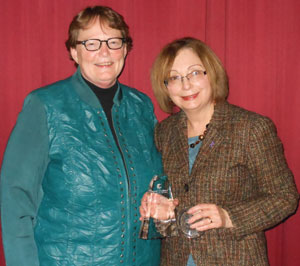 Sharon Katz, SAFEHOME executive director, received the Juliene Maska Advocate of the Year Award from the Kansas Coalition Against Sexual and Domestic Violence (KCSDV) during its ninth annual Safe Homes, Safe Streets reception in Topeka on Feb. 8.
Sharon Katz, SAFEHOME executive director, received the Juliene Maska Advocate of the Year Award from the Kansas Coalition Against Sexual and Domestic Violence (KCSDV) during its ninth annual Safe Homes, Safe Streets reception in Topeka on Feb. 8.
“Sharon is an incredible asset to the work in Kansas”, says Joyce Grover, KCSDV executive director. “We are so fortunate to have her as a colleague.”
Since taking the helm of SAFEHOME in 1992, Katz has expanded services, increased revenue and raised the agency’s standing as a respected and valuable part of the community. Beginning with only a skeleton staff, Katz herself often answered the 24-hour hotline and oversaw critical shelter repairs, while also writing grants and meeting with community members and potential donors.
Under her leadership the past 20 years, SAFEHOME has seen tremendous growth in services, moving from simply providing emergency shelter to offering a whole spectrum of professional supportive services including education and prevention, professional counseling, a unique and effective transitional housing program, a staff attorney, on-site district court program, and healthcare advocacy — services that now serve 6,500 people per year.
“It is difficult to describe a person whose life and passion embodies the meaning of the words pioneer, visionary, dedication, inspiration and champion for victims of domestic violence,” said Don Curtis, president of the SAFEHOME board of directors.
At one time, faced with an outdated and undersized facility, Katz spearheaded the purchase, renovation and a $6.2 million capital campaign to move the agency into a state of the art domestic violence facility. When initial plans to purchase and build a new facility were foiled by people afraid to have a domestic violence shelter in their community, Katz did not lose heart and continued seeking other options, including the purchase and renovation of the former hotel that became today’s SAFEHOME facility as of August 2006.
“We at SAFEHOME, as well as throughout the state of Kansas, owe Sharon Katz a huge debt of gratitude for daring to commit herself to helping victims of domestic violence and dedicating her life to this cause,” said SAFEHOME Associate Director Janee’ M. Hanzlick.
Katz was delighted to be recognized by KCSDV.
“The idea of being an advocate is what I’ve always seen myself as. I may be the director, I may be the professional making sure everything happens, but what I really want to do is save women’s lives and help victims of domestic violence. That’s being an advocate and I was really honored by that,” Katz said.
Katz said the most gratifying thing about her tenure has been the growth and professionalism of the agency. Her biggest achievement to date may be spearheading the move to SAFEHOME’s current facility.
“This makes it so much more comfortable of a place for victims and their children,” Katz said.
When SAFEHOME acquired the new building, the agency anticipated it could accommodate 40 women and children.
“We thought it was as big as we’d ever need,” Katz said. “We still say that our limit is 45, but we accept victims and their children who are in danger beyond the 45 if there is no other safe option.”
Due to the economy, and a new procedure followed by police departments in Johnson County, SAFEHOME quickly began accommodating 45 on a regular basis. In fact SAFEHOME has accommodated as many as 57, “but that includes people sleeping on mattresses in the living room.”
“When people are in lethal situations or in severe danger, we take them in.”
Katz said SAFEHOME’s biggest challenge is finding ways to meet the needs of the larger numbers the shelter needs to serve. One reason those numbers are growing is the way police departments handle domestic violence incidents. At the urging of Johnson County District Attorney Steve Howe, and with the assistance of SAFEHOME, police now conduct “lethality assessments” at the scene of domestic crimes. If it is determined, through a very short questionnaire, that the victim is at risk of becoming a victim of homicide, additional steps are taken.
“The officer will turn to the victim and say ‘I am afraid for your life. I have this cell phone here and I am calling SAFEHOME right now and I really want you to talk to someone there.’ So the last six months of 2011 we averaged 70 additional calls a month because of that.”
Katz said the new approach is making a difference for a large number of victims, who are either agreeing to a follow-up call or coming in to speak with a SAFEHOME staff member.
“We are continuing to save lives, but it’s been very difficult for us to keep up with it staff wise and space wise,” Katz said.
Katz is honored to work with these women and that she, and the agency, has been recognized for its works.
“I just hope we’ve saved a lot of lives.”


